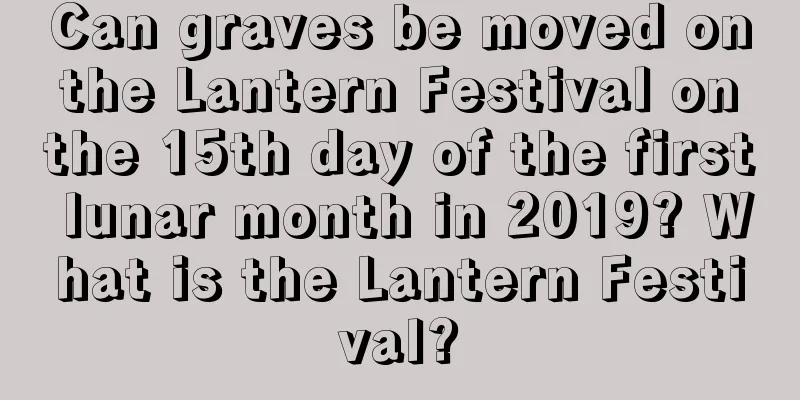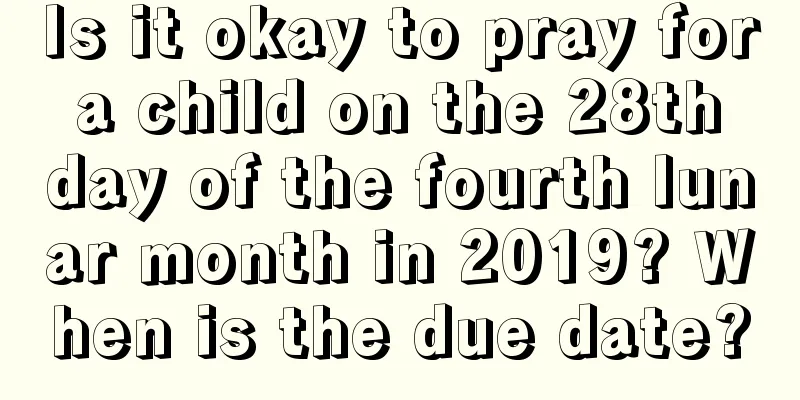Can graves be moved on the Lantern Festival on the 15th day of the first lunar month in 2019? What is the Lantern Festival?

Introduction: Relocating graves is also a very important matter, so it is generally necessary to choose an auspicious day to relocate graves. So can graves be relocated on the Lantern Festival on the fifteenth day of the first lunar month in 2019? What festival is the Lantern Festival? For more details about the 2019 New Year and the first month of the lunar calendar, please visit Mr. Shuimo’s website for consultation!2019 Lunar calendar for the Lantern Festival on the 15th day of the first lunar month:The 15th day of the first lunar month of the year 2019 (Lunar calendar)February 19, 2019, Tuesday, Pisces (solar calendar) 【Today’s lunar calendar is suitable】 Pray for blessings, get married, migrate, bring in wealth, move into a new house, build a stove, accept a bride, recruit a son-in-law, offer sacrifices, fast and pray, build, seek an heir, lift the groundbreaking ceremony, take up a post, erect pillars, plant, issue a certificate, capture and enroll in school [Today’s taboos in the almanac] Repair graves , bury people, set up beds, cut trees, raise beams, take in livestock, build houses, start drilling, travel meridians, break ground, open businesses From the above contents of the almanac, we can know that the day of the Lantern Festival in 2019 is taboo in the almanac, so today is not a suitable day for repairing graves or breaking ground [i.e. moving graves]! Analysis of matters needing attention regarding grave relocation:1) The best time to relocate a grave is before noon, to avoid the Yang energy at noon from burning the corpse. If there are too many ancestors, you can stop digging up the bones at noon, and cover the grave and bones with black cloth. The corpse will be moved after noon.2) The first three shovels of earth in digging the grave must be done by the ancestor’s son or grandson. If there are no children or grandchildren, a "blessed person" will be needed to take their place. (A blessed woman refers to a woman who has both living parents, a husband, and two children.) 3) The burial arrangement should be distinguished by priority: the east is the upper position and the west is the lower position; the northeast is the upper position and the southwest is the lower position; the north is the upper position and the south is the lower position; the northwest is the upper position and the southeast is the lower position (according to the post-natal Bagua, the yang position is the upper position). If a man has two wives, the husband should be buried at the top, the first wife at the second, and the second wife at the third. 4) The eldest son holds the spirit head banner, breaks the funeral basin, and walks in front of the spirit with male relatives, while the female relatives follow the spirit in a car. The coffin is covered with a "coffin cover". Eight, sixteen, twenty-four or thirty-six people would carry the coffin to the cemetery and bury it in a grave that had been dug in advance by a fortune teller. The grave would be covered with soil, and a spirit banner held by the eldest son would be inserted on the grave. Paper gold and silver vaults would be burned in the cemetery for the deceased to "enjoy" in the underworld. 5) When the remains of the ancestor are about to be unearthed, the ancestor's daughter or granddaughter must hold up a black umbrella or a reed mat to block the sunlight. The sunlight must not be allowed to overheat the remains of the ancestor, lest the ancestor's soul be scattered and unable to reincarnate. 6) When digging up a grave (breaking ground), one must set up an altar, burn incense, offer sacrifices to ancestors, burn money, pray about the reasons and address of the ancestor's relocation, and ask for the ancestor's blessings and protection for future generations. Nine points to note when moving graves 7) Any new grave that has been buried for less than one year cannot be relocated. If the burial is moved within a year, someone in the family may die. 8) After the second burial of the bones is completed, the original grave pit must be filled and leveled with a carrot and nine copper coins. After filling the grave, old coffins, funeral clothes, etc. should be burned completely and should not be taken to the new tomb. 9) After the grave is dug, the remains of the ancestors must be placed neatly, with all joints placed in their original positions. If any knuckles are missing, the soil must be carefully turned over to search for them, in order to avoid physical harm to future generations. The bones of the hands, feet and knees of the remains must be placed according to the normal physiological structure and must not be rotated front to back or left to right. Otherwise, it would be like the ancestors had their hands and feet tied up and were kneeling on their knees, and the descendants would surely have bad luck and no one would be prosperous. What is the Lantern Festival?The fifteenth day of the first lunar month is the Lantern Festival, also known as the Shangyuan Festival, Yuan Ye, and Lantern Festival. The first month of the lunar calendar is the first month of the year. The ancients called the night "xiao", so the fifteenth day of the first month is called the Lantern Festival. The fifteenth day of the first lunar month is the first full-moon night of the year. It is also the night when a new year begins and the earth returns to spring. People celebrate this night, which is also a continuation of the celebration of the New Year. Sima Qian created the Taichu Calendar and listed the Lantern Festival as a major festival. It flourished during the Sui, Tang and Song dynasties. "Book of Sui·Music" states: "Every first month, all nations came to pay tribute, and they would stay until the 15th day in a theater outside Duanmen and inside Jianguomen, which stretched for eight miles, with plays set up as the theater stage." There were tens of thousands of people participating in the singing and dancing, from dusk to dawn, and ending at the end of the day. With the changes of society and times, the customs and habits of the Lantern Festival have undergone great changes, but it is still a traditional Chinese folk festival.In ancient Chinese customs, the Shangyuan Festival (Tianguan Festival), the Zhongyuan Festival (Diguan Festival, Yulan Festival), and the Xiayuan Festival (Shuiguan Festival) are collectively known as the Three Yuans. The formation of the Lantern Festival customs took a long process. According to general information and folk legends, the fifteenth day of the first lunar month was already taken seriously in the Western Han Dynasty. The activity of Emperor Wu of Han worshipping "Taiyi" in Ganquan Palace on the first night of the first lunar month was regarded by later generations as a precursor to the worship of gods on the fifteenth day of the first lunar month. However, the Lantern Festival on the 15th day of the first lunar month truly became a folk festival after the Han and Wei dynasties. Since ancient times, the custom of the Lantern Festival has been dominated by the lively and festive custom of viewing lanterns. Traditional customs include going out to admire the moon, lighting lanterns and fireworks, guessing lantern riddles, eating Yuanxiao together, pulling rabbit lanterns, etc. In addition, many places have added traditional folk performances such as dragon lantern and lion dances, stilt walking, land boat racing, yangko dance, and Taiping drum performances to the Lantern Festival. In June 2008, the Lantern Festival was selected into the second batch of national intangible cultural heritage. Fortunes in life can be good or bad, and calculating the direction of your fortune in advance can help you nip problems in the bud, reverse unfavorable situations, and make your life smoother and brighter. To calculate your life fortune over the next ten years, please click on the [Premium Calculation] button below for accurate calculation. I wish you all the best in your life! |
<<: Is it a good idea to hold the funeral on the 29th day of the first lunar month in 2019?
>>: Is it possible to get engaged during the Lantern Festival in 2019?
Recommend
Is it a good time to repair graves on the fifth day of March in 2020? Check the auspiciousness and inauspiciousness of March 28!
Introduction: Sometimes it is necessary to choose ...
Which days in September of the lunar calendar in 2019 are not suitable for picking up a car?
Some people say that the ninth month of the lunar ...
What should we do during the Ghost Festival and the Ghost Festival in 2019? Are there any activities during the Ghost Festival?
Introduction: The Ghost Festival is an important f...
Is it good or bad for people born at 3:00 pm on Mother’s Day in the Year of the Pig 2019?
Mother's Day in 2019 is May 12th in the Gregor...
Can a funeral be held on the third day of the fourth lunar month in 2021?
Although we don't want our loved ones to leave...
Is November 26th of the lunar calendar in 2021 a good day? Is it suitable for starting work?
As the eleventh month of the lunar calendar arrive...
Is Christmas Eve 2021 an auspicious day? What is the omen for Christmas Eve?
Christmas Eve is a very important holiday for West...
Is the day before the winter solstice on the 26th day of the 11th lunar month in 2019 suitable for worshiping ancestors?
The eleventh month of the lunar calendar is also k...
Where is the God of Wealth on July 12, 2017? Check the God of Wealth's location
1. What day is July 12 in the lunar calendar of 2...
If you get pregnant in May of the lunar calendar in 2021, when will you give birth? Will the baby be healthy?
Many expectant mothers and fathers are curious abo...
Feng Shui Notes on the Beginning of Winter What is the exact time of the Beginning of Winter in 2020?
Introduction: Different solar terms also have thei...
Can I pick up the car during the Ghost Festival in 2018? Is it appropriate to pick up the car during the Ghost Festival?
Introduction: According to Chinese tradition, it i...
If the Feng Shui is not good, it will be difficult for the eldest son to inherit the throne
Introduction: Under the traditional feudal monarch...
What are the taboos on April 13th of the leap lunar calendar in 2020?
What are the taboos on April 13th of the leap lun...
What is the zodiac sign of a child born on the second day of the second lunar month in 2019?
What is the zodiac sign of a child born on the sec...









